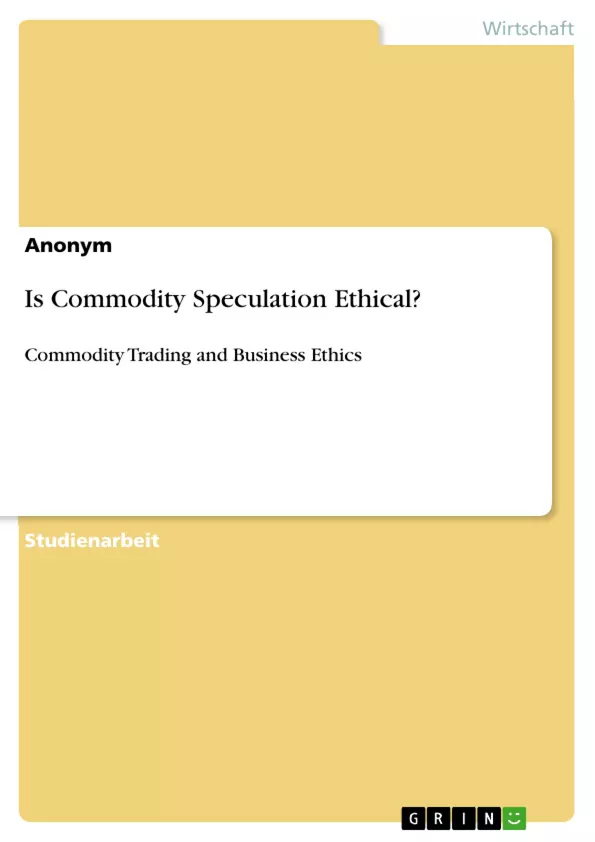The aim of the paper is to discuss commodity trading and food speculation based on ethical theories. Since we had demonstrations in the last couple of years like "Occupy Wall Street" and others fight against banks, it is important to explain the different arguments for and against commodity trading. I find many different arguments and theories about the whole subject.
Is the speculation on commodities something which helps people or is it something people have to suffer from? Are banks the reason why people even in the year of 2018 suffer from hunger? In the following I will discuss the reasons for the worldwide hunger problem, I will take a look at commodity trading and how banks work in this sector. Last I will review the situation from an ethical point of view and say if it is ethically correct to trade commodities on stock exchanges. This paper should help to understand the whole discussion and should take a look at different ethical theories.
On the other hand, it is important to see why banks and institutions started with the trading of commodities. First of all the overall volume in this section of the financial market started to grow later than other parts of the industry. When in the late 90s the financial market to grow fast and the money inflow got bigger and bigger the focus of investors wasn't on the commodity market. The development of the commodity market was furthermore just a result of the developments before. Banks argued that they just provided a platform for a new market which also would help the economies and the people in poor countries.
Inhaltsverzeichnis
- Introduction
- Topic and Relevance
- Research Question
- Commodity speculation
- History of the discussion
- The market of commodity trading
- View of the society
- Moral view on commodity trading
- Different ethical approaches
- Nietzsche's approach on business ethics
- Ayn Rand's view on moral
- Conclusion
- Executive Summary
Zielsetzung und Themenschwerpunkte
Der Text untersucht die ethische Dimension der Rohstoffspekulation. Dabei wird die Debatte um die Rolle der Banken und Finanzmärkte bei der Entstehung von Hunger und Armut in Entwicklungsländern beleuchtet. Das Hauptanliegen ist es, die unterschiedlichen Perspektiven auf diese Thematik zu analysieren und zu bewerten.
- Ethische Aspekte der Rohstoffspekulation
- Zusammenhang zwischen Rohstoffspekulation und Hunger
- Einfluss von Banken und Finanzmärkten auf den Rohstoffhandel
- Verschiedene ethische Ansätze und deren Anwendung auf die Rohstoffspekulation
- Die Rolle von NGOs und internationalen Organisationen in der Debatte
Zusammenfassung der Kapitel
- Introduction: Das Kapitel stellt den Kontext der Debatte um Rohstoffspekulation und Hunger dar. Es werden die Argumente von NGOs wie „foodwatch“ beleuchtet, die Banken und Finanzmärkte für die Preissteigerungen und die Nahrungsmittelknappheit verantwortlich machen.
- Commodity speculation: Dieses Kapitel beleuchtet die Geschichte der Rohstoffspekulation und den Boom des Marktes für Rohstoff-Futures in den Jahren vor der Finanzkrise. Es wird die Korrelation zwischen der steigenden Volatilität der Lebensmittelpreise und dem Wachstum des Rohstoffhandels diskutiert.
Schlüsselwörter
Die zentralen Themen des Textes sind die ethische Bewertung der Rohstoffspekulation, der Zusammenhang zwischen Rohstoffhandel und Hunger, die Rolle von Banken und Finanzmärkten, sowie die Anwendung verschiedener ethischer Ansätze auf diese Fragestellungen.
Häufig gestellte Fragen
Ist Spekulation mit Nahrungsmitteln ethisch vertretbar?
Die Arbeit diskutiert diese Frage anhand verschiedener ethischer Theorien und untersucht, ob Spekulation zu Preissteigerungen führt, die Menschen in armen Ländern leiden lassen.
Welche Rolle spielen Banken im Rohstoffhandel?
Banken stellen Plattformen für den Handel mit Rohstoff-Futures bereit. Kritiker wie NGOs werfen ihnen vor, durch massiven Kapitalzufluss die Volatilität der Preise künstlich zu erhöhen.
Was ist das Argument der Befürworter von Rohstoffspekulation?
Befürworter argumentieren, dass Spekulanten dem Markt notwendige Liquidität geben und es Produzenten (z.B. Bauern) ermöglichen, sich gegen Preisschwankungen abzusichern.
Welche ethischen Ansätze werden in der Arbeit herangezogen?
Die Arbeit betrachtet unter anderem wirtschaftsethische Ansätze, Nietzsches Perspektive sowie Ayn Rands Auffassung von Moral im Kontext des freien Marktes.
Gibt es einen direkten Zusammenhang zwischen Spekulation und Welthunger?
Die Arbeit analysiert die Korrelation zwischen dem Boom der Rohstoff-Futures Ende der 90er Jahre und den steigenden Lebensmittelpreisen, weist aber auch auf komplexe andere Ursachen für Hunger hin.
- Arbeit zitieren
- Anonym (Autor:in), 2018, Is Commodity Speculation Ethical?, München, GRIN Verlag, https://www.grin.com/document/456468



